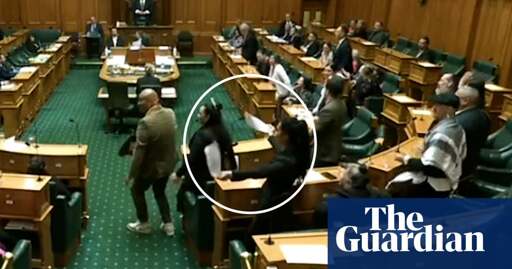New Zealand’s parliament has erupted into fiery debate, personal attacks and a haka over a controversial bill that proposes to radically alter the way New Zealand’s treaty between Māori and the crown is interpreted.
The treaty principles bill was tabled by the libertarian Act party – a minor partner in New Zealand’s coalition government – and passed its first reading on Thursday, amid scathing speeches and disruptions.
A vote on the bill was momentarily suspended, when opposition parties and people in the public gallery joined in a haka (Māori dance or challenge), led by the Te Pāti Māori MP Hana-Rawhiti Maipi-Clarke, who proceeded to rip up a copy of the bill.
The bill seeks to remove a set of well-established principles that has flowed from New Zealand’s founding document, the treaty of Waitangi – an agreement signed in 1840 between more than 500 Māori chiefs and the crown, and which is instrumental in upholding Māori rights.
The principles of the treaty have been developed over 50 years by courts, tribunals and successive governments to help guide the relationship between Māori and ruling authorities and iron out differences in interpretations over the English and Māori texts of the original treaty. Many principles have been developed and continue to evolve, but the most recognised are broadly defined as participation, partnership, protection, and redress.
They have been used in efforts to revitalise the Māori language, including making it an official language, and were used to establish a Māori health authority to reverse poor health outcomes for Māori, which the coalition government dismantled this year.
Critics of the bill say Act’s proposal undermines the treaty and its principles, which they believe threaten Māori rights and promote anti-Māori rhetoric.
Māori members of New Zealand’s parliament disrupted the passage of a bill that would reinterpret the 1840 Treaty of Waitangi, which uplifts Indigenous peoples. The MPs performed a haka—a traditional Māori dance and chant—causing the session to be suspended.



Anyone know if there’s a way we can assist in this matter? (short of donating funds to grassroots campaigners, because I am currently scraping by on welfare.)
Should we be targeting embassies with letter campaigns, <terminally online quasi-legal activities> or <fed-post-lite removed> towards ambassadors?
I don’t want to do anything counter productive but NZ has generally been a beacon of hope in the southern hemisphere on a number of fronts and “doing indigenous consultation and representation” has been one of those things where, it may not have ever been sufficient, but it’s been better than what most of our countries can manage to do. Maori representation has been part of what everyone I know considers the prime examples of NZ being a more rational and honest and “progressive” and generally better nation than my own. Which in turn means a lot of us have held NZ in generally quite high regard.
NZ has been one of those few majority white nations where in the past, the leaders have appeared to lead the people towards building a more honest and representative culture.
I would suggest going to protests and marches. We have been doing a lot of them across the country.
I hope they help.